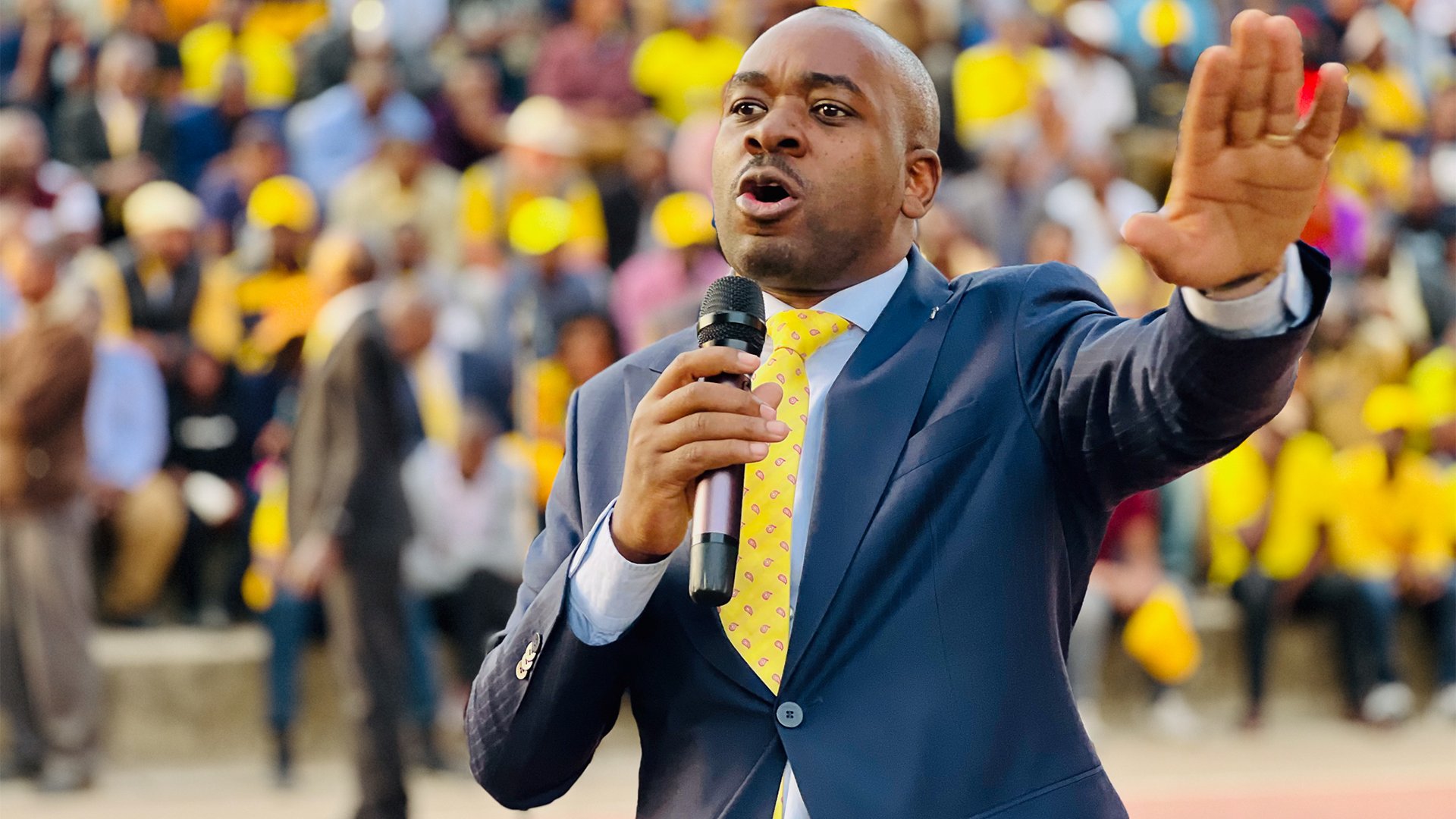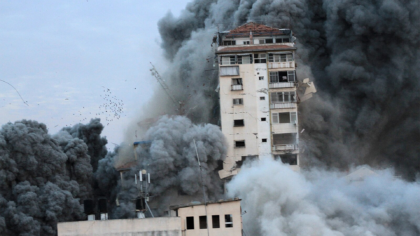Zimbabwean Government Mounts Post-Election Propaganda Campaign
This article is a commentary reflecting the lived experience, research and/or perspectives of the author. The views and opinions expressed don’t necessarily represent those of Unicorn Riot.
In Quentin Tarantino’s 1997 movie, “Jackie Brown,” a flight attendant wants to steal half a million dollars from a sting operation. Ms. Brown cannot hide the money bag as she is spooked by accomplices of the gun runner whom she is moving the cash for, and detectives who have offered her a plea deal to bust him. Instead, she tempts a detective with an underdeclared amount, baits an accomplice to stuff a packet of marked bills into her shorts and alerts a shop assistant to a forgotten bag of beach towels – her money bag, in fact – in the dressing room. And so Ms. Brown sidesteps every stop in the heist by giving away the full package to the full view of witnesses but working their interest on the smallest detail of the matter.
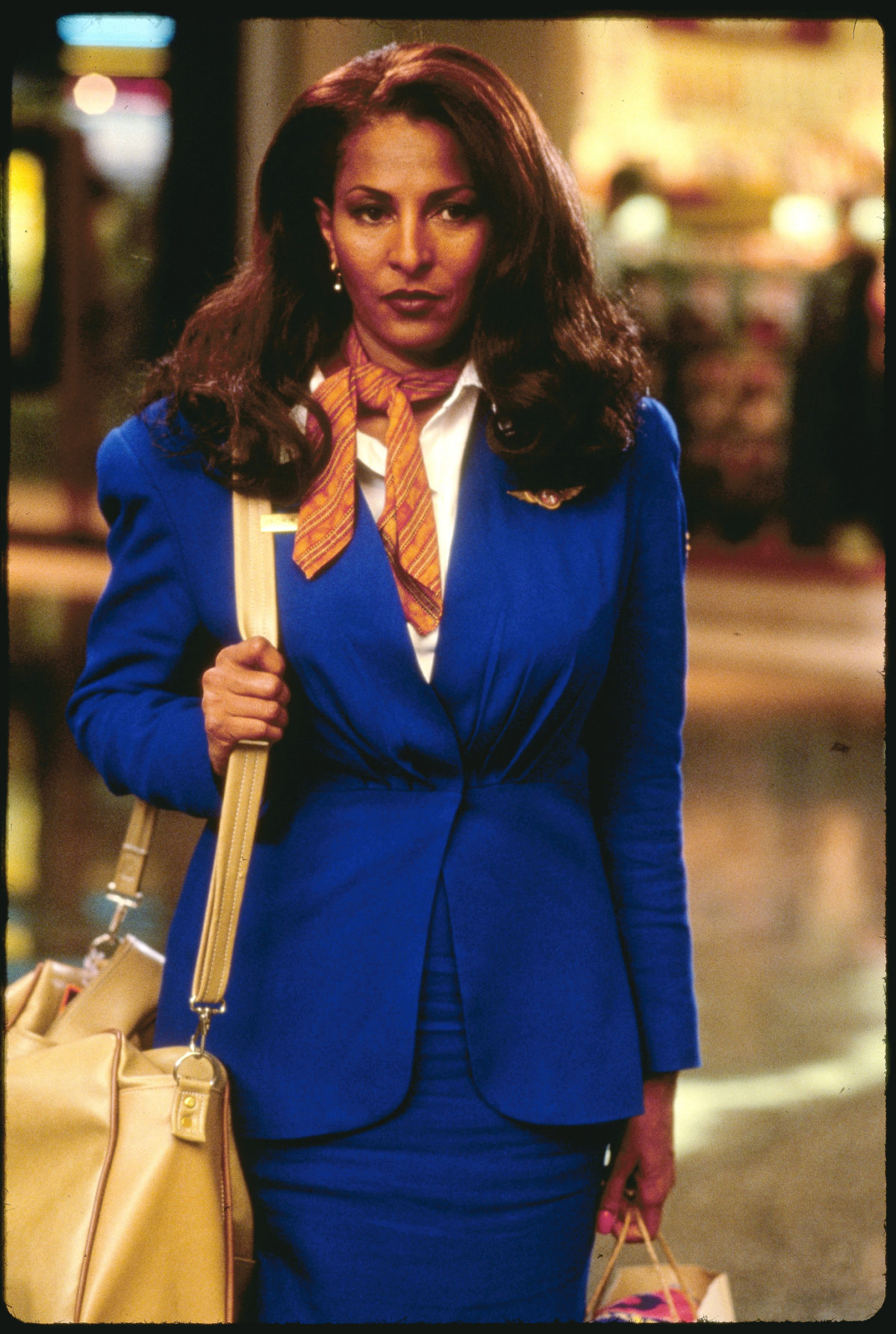
Jackie’s game of hiding in plain sight has a daring new use case as Emmerson Mnangangwa’s government mounts propaganda on the Southern African Development Community (SADC) in the aftermath of Zimbabwe’s disputed August 23-24 elections. On August 25, SADC Election Observer Mission (SEOM) said, in a preliminary statement, the elections which secured Mnangagwa a second term with 52.6 percent of the vote “fell short of the requirements of the Constitution of Zimbabwe, the Electoral Act, and the SADC Principles and Guidelines Governing Democratic Elections (2021).”
But the regional bloc seemed to change its mind recently as Angola’s external affairs minister and SADC Council of Ministers chairperson Téte António was quoted in state-controlled media congratulating Zimbabwe “on holding free and fair elections in a climate of peace and tranquility, in accordance with the regional body’s principles and guidelines.” Only, António never said this.
What he said, in fact, presiding over the September 27 meeting to review SADC’s draft budget for DRC, was:
“We would like to congratulate the people of Zimbabwe for the recent elections held and we hope that the legislative elections in the Kingdom of Eswatini of September will take place in a climate of tranquility and peace in line with the constitution and the principles and guidelines governing the holding of elections in the SADC.”
Téte António
Sadc Council of Ministers have congratulated Zimbabwe for holding violence free, free and fair, credible elections in accordance with SADC, its Constitution and its Electoral Act. pic.twitter.com/MVSAnPmOEb
— Nick Mangwana (@nickmangwana) September 27, 2023
The Zimbabwean Broadcasting Corporation screened a video clip of the full quote, chancing on poor audio to frame it as a regional endorsement of Zimbabwe’s elections. State-run daily The Herald gave it a more colorful spin, misdirecting António’s anticipation of Eswatini’s elections, due in two days at the time, to prove Zimbabwe’s recent elections free and fair. Energized by the false report, information secretary Nick Mangwana, former information minister Jonathan Moyo and the state-leaning tendency of the Zimbabwean internet went to town with a narrative that the SADC has moved on from the country’s election dispute.
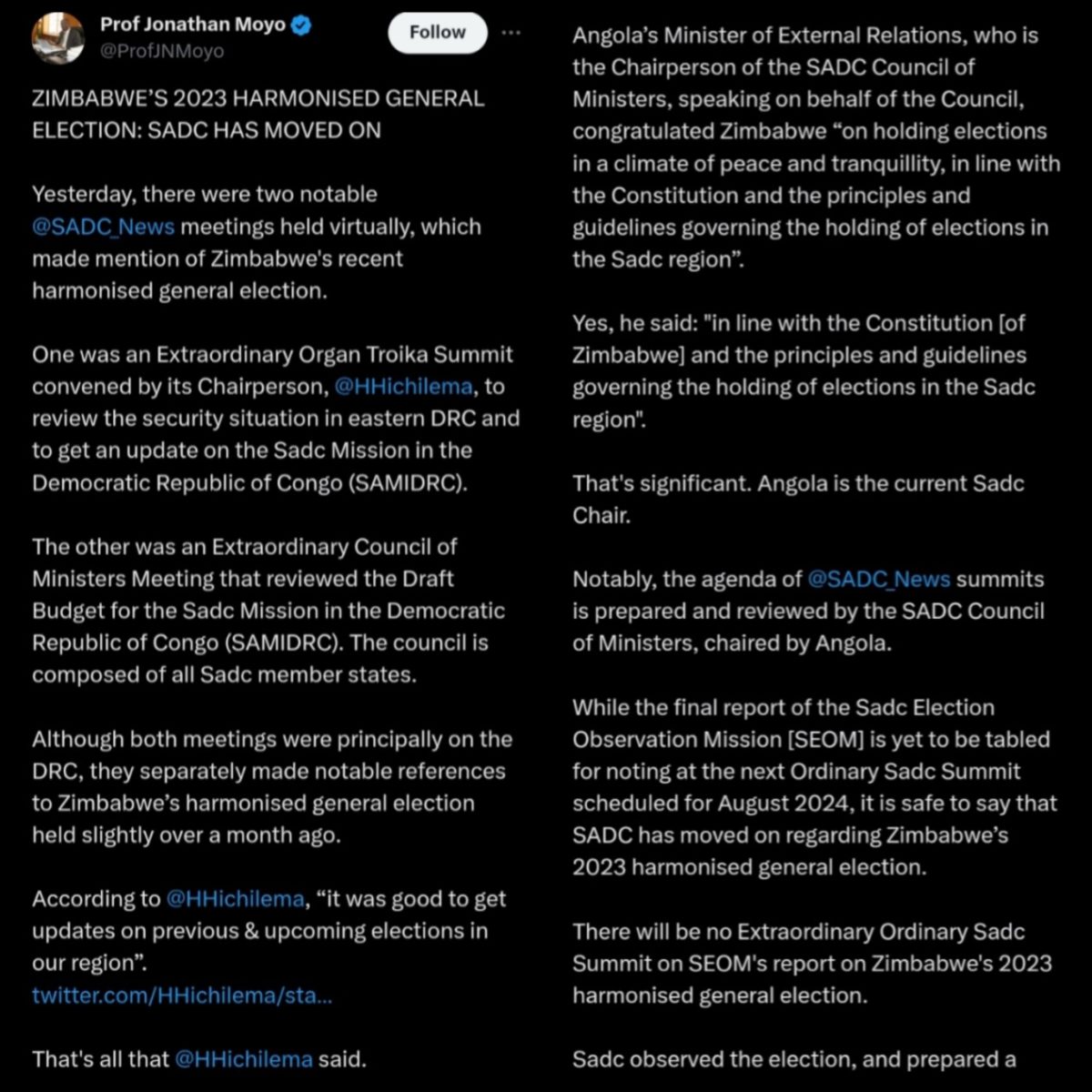
The Jackie Brown-esque stroke of disinformation further helped state media crowd out actual proceedings on Zimbabwe from a SADC meeting held the previous day. Chaired by Zambia’s foreign minister Stanley. K. Kakubo on September 26, the Ministerial Committee of the Organ Troika (on Politics, Defense and Security) “noted with concern, the personal attacks and threats on the media that have been directed at the SEOM Head of Mission Dr. Nevers Mumba and the Chairperson of the Organ, His Excellency Mr. Hakainde Hichelima since the Zimbabwe SEOM released its Preliminary Statement on 25th August 2023.”
“The attacks were made by individuals in both the ruling ZANU PF political party and some in high-level positions in the Government of Zimbabwe,” the SADC Ministerial Committee of the Organ Troika further noted. “The narrative in these attacks has been that the SEOM Preliminary Statement on the Zimbabwean elections was personally authored by Dr. Nevers Mumba.”
Although SADC does not have a binding role in member countries’ elections, it has previously stepped in to resolve the breakdown of democracy in Zimbabwe. Following a bloody 2008 presidential run-off, the regional bloc facilitated talks that resulted in a unity government. Nelson Chamisa, the main opposition candidate who polled 44 percent of the vote, has refused to recognize 80-year Mnangagwa as legitimately elected head of state.
The Citizens Coalition for Change (CCC) leader concurs with several election watchdogs that voter suppression and intimidation unduly influenced the result. Having sat out a court challenge, citing Mnangagwa’s chokehold on the judiciary, Chamisa has written SADC to set aside the Zanu PF leader’s victory and facilitate a transitional authority which will set the stage for a fresh election.
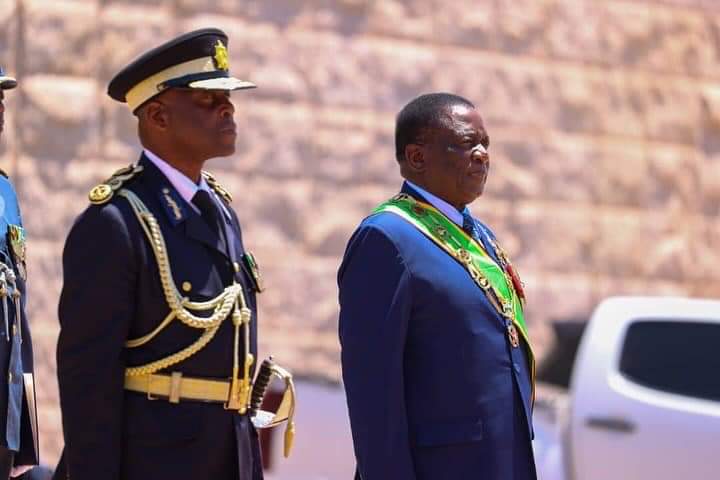
The Mnangagwa administration has, in turn, framed the SADC preliminary election report into:
- A solo-authored document.
- A bilateral fallout between Zimbabwe and Zambia, personalized against Organ chairperson Hichilema and SEOM chairperson Mumba.
- A clash between liberation-era political parties, decades in power across SADC, and upstarts looking to reward their former opposition allies still in the trenches.
- A Western-sponsored attack on Zimbabwe’s sovereignty.
- A procedural opinion with no binding outcome on Zimbabwe’s internal processes.
“SADC Belongs to Liberation-era Political Parties”
The loosely connected positions were reflected by Zimbabwe’s war veterans minister Christopher Mutsvangwa in a recent interview given in the Shona language to the Voice of America (VOA) Studio 7.
“Mumba and your likes, leave our SADC alone[…] We know where it came from. It’s not for Western puppets. And you, Western countries, don’t try to appropriate institutions we birthed during our liberation struggle when you were oppressing us. SADC is not yours. It belongs to us, national liberation movements, SWAPO [Namibia], ANC [South Africa], Frelimo [Mozambique], MPLA [Angola], Zanu PF [Zimbabwe]. We are the owners of SADC.”
Christopher Mutsvangwa
The Zimbabwean minister does not need to sound convincing. It does not matter side you lean between Zimbabwe and Zambia; the true dimension of Mutsvangwa’s cynical entitlement is framing such a conflict in the first place. Like Jackie Brown and the daylight tricksters of Edgar Allan Poe’s “The Purloined Letter,” Zanu PF wants nothing more than to work our interest on smaller details of the matter. The more backward Mutsvangwa’s rhetoric is, the further normative engagement is displaced from the SADC process at hand.
SADC’s Ministerial Organ Troika challenged the misdirected attribution of the election report to one member state:
“For the purposes of the August 2023 Harmonized Elections, observers were seconded from the Republic of Angola, the Republic of Botswana, the Kingdom of Eswatini, the Republic of Malawi, the Republic of Mozambique, the Republic of Namibia, the Republic of South Africa, the Republic of Tanzania and the Republic of Zambia.”
SADC Press Release
Chamisa’s Gambit
In his first public appearance since Emmerson Mnangagwa was sworn in for a second term on September 4, 2023, Chamisa named five conditions for a fresh election:
- Disbanding of Mnangagwa’s new government for a transitional authority.
- Replacement of Zimbabwe Elections Commission (ZEC) with an independent commission.
- A credible voters’ roll.
- A delimitation exercise that agrees with the constitution.
- An unprecedented diaspora vote.
“Before we go to the [fresh] elections, there must be a transitional authority. Some interpret this to mean a government of national unity, but no, we don’t want to go there yet,” Chamisa told supporters at the launch of his consultative post-election outreach in Bindura on September 21. “The transitional authority is the one that will resolve outstanding issues[…] Never again shall we have the current Zimbabwe Electoral Commission governing Zimbabwean elections.”
Zimbabwe’s constitution, adopted when Chamisa’s former party shared power with Zanu PF after the discredited 2008 presidential run-off, provides for 12 democratically themed commissions including ZEC. Two terms in power after the government of national unity, Zanu PF has blatantly commandeered the commissions.
The main opposition brought up voter suppression in its Harare and Bulawayo strongholds as a deal breaker in ZEC’s handling of recent polls. 36 percent of polling stations observed by the SADC Election Observer Mission did not open on time, and some remained closed more than 12 hours after the time provided in the Electoral Act. Delays plunged the process into opacity and disenfranchisement of some voters who could not brave long night queues. Originally scheduled for August 23, the elections were forced into an unprecedented second day by a presidential decree. Riled by ZEC’s fealty to the ruling party, Chamisa wants an independent commission to take over running of the elections.
Going into the consultative outreach, which has taken him to Mashonaland Central, Mashonaland West, Mashonaland East, Manicaland, Masvingo, Matebeleland South and Matebeleland North so far, Chamisa needed to show his supporters clarity of motive. The 45-year old, who is also a lawyer and a pastor, especially needed to determine which aspects of the election are in dispute, considering that his councilors and legislators have already taken their oaths of office.
“Winning or losing is not the basis of legitimacy. Legitimacy are standards that must be followed,” Chamisa remarked. “The election that brought in MPs and councilors did not pass the test that must be passed across the whole country,” he said, adding that CCC’s winning candidates are filling a leadership vacuum pending a SADC and African Union-facilitated democratic reboot. CCC legislators boycotted Mnangagwa’s State of the Nation address at the official opening of Parliament last week, doubling down on the party’s refusal to recognize the president.
Terror in the Countryside
CCC’s “postmortem” interface (conference) kicked off in Mashonaland Central, a traditional Zanu PF stronghold where Mnangagwa registered his strongest show with 77.41 percent of the provincial vote. Opposition supporters at the Bindura interface outlined a climate of terror in the run up to August 23, with testimonies of arson, torture, abductions and targeted arrests, with posting of campaign material proscribed for their candidates.
“Army helicopters were seen flying above, sowing fear and intimidation among the people.” A CCC supporter referred to polling day intimidation, concurring with Mt. Darwin, Muzarabani and Rushinga testimonies, “the presence of Forever Associates of Zimbabwe only added to the atmosphere of terror.”
Chamisa demands the disbanding of FAZ as a condition for a fresh vote. The quasi-security organization, allegedly linked to the Central Intelligence Organization and Zanu PF, ran the ruling party’s primary elections in March this year. It stands accused of illegal activities, including voter intimidation, in the general election cycle.
Surveillance and retribution have been two of Zanu PF’s go-to methods since the 1980 elections. This year, observer missions noted FAZ, suspiciously accredited as an August 23 election watchdog, taking down voters’ details to demonstrate that they were monitoring a supposedly confidential polling activity.
Assisted voting and choreographed queuing of voters after their village heads were backed with chilling reminders of previous election violence. Zanu PF went on a campaign of terror in 2008, with 200 to 400 opposition supporters estimated dead. Abductions, torture and amputations, termed “long sleeve” and “short sleeve,” were widely reported ahead of the presidential run-off. First round frontrunner Chamisa’s then party president, Morgan Tsvangirai, pulled out of the election, while Robert Mugabe went on to pull off a bloody landslide.
While subsequent elections have been relatively peaceful, violence stalks Zimbabwe’s social memory. Mnangagwa cynically denies his party’s violent record, invoking the lack of documented convictions, while his foot soldiers continue to intimidate villages. The fatal shooting of nine protesters by a suspected Zimbabwe National Army officer a day after 2018 elections, while officially denied by government, effectively dissuaded demonstrations for much of Mnangagwa’s previous term.
However, emphasis on FAZ may be superficial as the group is merely a new front for the well-established activities of the ruling party, the Central Intelligence Organization and the corrupt cartels who will likely reboot it as a new entity.
A Sandman Come to Hell
Chamisa in a transitional government would be a Sandman come to hell with nothing but an outstretched arm. Twice beaten, he would be bitterly alert to the fact that Zimbabwean elections are not decided by ordinary voters. He would seek to woo or replace Zanu leaning bigwigs in the army, police, judiciary, the electoral commission, Zanu PF itself and other current power brokers in close range for the next vote. In Zanu PF, he will find nothing less than dormant factions prepared to tear apart family and foe alike for the next elections.
Mnangagwa is in his last term, bar a constitutional amendment to the two term limit provided in the 2013 constitution. He will be leading Zanu PF in trust, in lieu of a takeover by vice president and Mugabe coup general Constantino Chiwenga in 2028. Mnangagwa must not be seen to cozy up to Chamisa and give away too much. He applied as much pressure on Mugabe, according to a Wikileaks cable, when the founding prime minister was on the verge of handing over a security ministry to Tsvangirai during power-sharing talks in 2008. Zanu PF members fought on two fronts in the unity government, against Tsvangirai’s MDC, and against party comrades as they positioned themselves for a post-Mugabe era. With so much to risk, the natural course for Mnangagwa is to reject a power sharing deal.
Smarting from the SEOM report, Mnangagwa took the sovereignty line with SADC at a swearing in ceremony ungenerously attended by three heads of state, including 2024 presidential candidates, DRC’s Felix Tshikiledi and South Africa’s Cyril Ramaphosa. Zimbabwe’s SADC, AU and UN membership, the Zanu PF leader said, remains guided by the principles of mutual respect and the sovereign equality of nations. “The undermining of our national institutions and laws will not be condoned, under whatever guise. No country or group of persons should disregard the sovereign decisions and views of the people of our motherland, Zimbabwe.” Mnangagwa said.
SADC has traditionally rubberstamped chaotic Zimbabwean elections with the historic exception of 2008. SADC-facilitated talks led to a unity government where Mnangagwa and Chamisa served as defence minister and ICT minister respectively. In 2018, Chamisa lost a court petition to overturn Mnangagwa’s electoral victory. Negotiations never materialized as Chamisa refused to recognize Mnangagwa as president, which the latter was more interested in dialogue with smaller opposition parties that had no axe to grind with the election outcome. Chamisa appealed to regional intervention as Zanu PF dismissed his transitional proposal as “unconstitutional” and “madness.”
Now that Chamisa’s cards for 2023 are on the table, Mnangagwa has, once again, made it clear that he is not a fan of transitional deals. “Entertaining any talk of a rerun, a so-called government of national unity, or transitional authority is a pipe dream that will never happen,” he told a Zanu PF central committee meeting last week. “They [the opposition] must wake up from these pipe dreams. The people of our great motherland have spoken. The collective voices must be respected.”
Liberation-Era Alliances
South Africa’s response to the SEOM report provides the first indication that narrow alliances, unconditional decolonial ties and institutional lethargy within SADC could spell another missed opportunity for Zimbabwe’s troubled democracy. Speaking at the UN General Assembly, South Africa’s president Cyril Ramaphosa chalked down Zimbabwe’s deep seated democratic problems to expected logistical flaws.
“There is no perfect election, I can tell to you that,” Ramaphosa said. “There is contestation among parties, among candidates, and it often results in disputes, in doubts and certain practices not having been adhered to. It happens all over the world. Just look at what happened to America in their last election, those that claim they are the best in the world, it also happened to them.”
And if Mutsvangwa needs to convince anyone, he does not need to convince Zanu PF’s sister party ally in South Africa’s ruling party, the African National Congress. ANC Secretary General, Fikile Mbalula has been singing Mnangagwa’s defenses in the aftermath of the election. With Mutsvangwa, Mbalula sees opposition parties as “reactionaries and puppets” with “long tails everywhere.” The former South African transport minister has cast aspersions on election observer reports and their generally critical tone on Zimbabwe’s elections.
Mbalula’s tone on Zimbabwean elections emphasizes political alliances over democratic integrity. “Nelson Chamisa and his allies, they do not speak our language,” he told an ANC meeting a week after the vote. The sister party’s triumph bodes well for ANC which goes to election next year. “We know how the loss of ANC will affect the African revolution,” he said, accusing opposition parties of supporting a neoliberal and imperialist agenda.
A new ZBC documentary, “The Grand Regional Scheme – How Foreign Powers and Local Elites Are Destroying Africa,” recruits Zambian talking heads for a bare-knuckle attack on Hichilema and Mumba. The two Zambian leaders, ZBC says, are using SADC processes as a cover to reward old opposition alliance with Chamisa, sponsored by Western interests. The film also outlines a long-run diplomatic tiff by revisiting former Zambian president Levi Mwanawasa’s confrontations with Mugabe before his sudden death in 2007.
Discourses on decoloniality and multipolarity have unhelpfully framed democracy – its expression in free and fair elections – as a Western inconvenience. The SADC and the African Union are missing opportunities for a democratic reboot that will give empowered citizens the capacity to look within. Going into this election, at the Russia-Africa Summit in July, Mnangagwa was on President Vladimir Putin’s coat-tails with an unsolicited endorsement of his war in Ukraine stating: “Allow me to personally state that Zimbabwe is in solidarity with the Russian Federation in your country’s special military operation in Ukraine.”
Along with China, the subject of Zimbabwe’s Look East policy, Russia is a liberation-era ally of Southern African countries and provides a focus for “the new world agenda of the alternative multi-polar world” described by Mbalula.
For its part, Pretoria is a significant kingmaker on the Zimbabwean question. South Africa is Zimbabwe’s biggest trading partner, as well as hosting an estimated 5 million Zimbabwean immigrants. Zanu PF has leaned on the sister movement just as Rhodesia and apartheid South Africa weathered international criticism side by side.
With seven heads of states and four ruling parties in the 43 years that Zimbabwe has been under Mugabe and Mnangagwa’s Zanu PF, Zambia has evolved well beyond Mbalula and Mutsvangwa’s rhetoric. Numerous Zimbabwean liberation armies fought the war from Zambia which also hosted the ANC’s armed wing, Umnkotho weSizwe. But Zanu PF is more interested in the fact that Zambia is ruled by a former opposition leader, a fate that both sister liberation movements vigilantly resist arm in arm.
SEOM’s full report has been finalized for Organ chairperson Hichilema’s attention for onward transmission to Mnangagwa and ZEC. It will, perhaps, arrive in Harare a dramatically weakened document from a narrowly regimented SADC. As the Zimbabwe saga enters its decisive stretch, citizens across the region need to keep their eyes peeled and press their leaders for SADC’s democratic reboot.
Follow us on X (aka Twitter), Facebook, YouTube, Vimeo, Instagram, Mastodon, Threads, BlueSky and Patreon.

